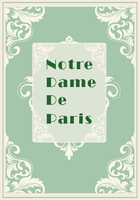
第102章 BOOK Ⅶ(11)
Arrived at the gallery of the colonnettes,he stopped a moment to take breath and to call down ten million cartloads of devils on the interminable stairs.He then continued his ascent by the narrow doorway of the northern tower,now prohibited to the public.A moment or two after passing the belfry,he came to a small landing in a recess with a low Gothic door under the vaulted roof,while a loophole opposite in the circular wall of the staircase enabled him to distinguish its enormous lock and powerful iron sheeting.Any one curious to inspect this door at the present day will recognise it by this legend inscribed in white letters on the black wall:'J'adore Coralie,1823.Signé,Ugène.'(This signé is included in the inion.)
'Whew!'said the scholar;'this must be it.'
The key was in the lock,the door slightly ajar;he gently pushed it open and poked his head round it.
The reader is undoubtedly acquainted with the works of Rembrandt—the Shakespeare of painting.Among the many wonderful engravings there is one etching in particular representing,as is supposed,Doctor Faustus,which it is impossible to contemplate without measureless admiration.There is a gloomy chamber;in the middle stands a table loaded with mysterious and repulsive objects—death's heads,spheres,alembics,compasses,parchments covered with hieroglyphics.Behind this table,which hides the lower part of him,stands the Doctor wrapped in a wide gown,his head covered by a fur cap reaching to his eyebrows.He has partly risen from his immense arm-chair,his clenched fists are leaning on the table,while he gazes in curiosity and terror at a luminous circle of magic letters shining on the wall in the background like the solar spectrum in a camera obscura.This cabalistic sun seems actually to scintillate,and fills the dim cell with its mysterious radiance.It is horrible and yet beautiful.
Something very similar to Faust's study presented itself to Jehan's view as he ventured his head through the half-open door.Here,too,was a sombre,dimly lighted cell,a huge arm-chair,and a large table,compasses,alembics,skeletons of animals hanging from the ceiling,a celestial globe rolling on the floor,glass phials full of quivering gold-leaf,skulls lying on sheets of vellum covered with figures and written characters,thick manus open and piled one upon another regardless of the creased corners of the parchment;in short,all the rubbish of science—dust and cobwebs covering the whole heap.But there was no circle of luminous letters,no doctor contemplating in ecstasy the flamboyant vision as an eagle gazes at the sun.
Nevertheless the cell was not empty.A man was seated in the arm-chair,leaning over the table.Jehan could see nothing but his broad shoulders and the back of his head;but he had no difficulty in recognising that bald head,which nature seemed to have provided with a permanent tonsure,as if to mark by this external sign the irresistible clerical vocation of the Archdeacon.
Thus Jehan recognised his brother;but the door had been opened so gently that Dom Claude was unaware of his presence.The prying little scholar availed himself of this opportunity to examine the cell for a few minutes at his ease.A large furnace,which he had not remarked before,was to the left of the arm-chair under the narrow window.The ray of light that penetrated through this opening traversed the circular web of a spider,who had tastefully woven her delicate rosace in the pointed arch of the window and now sat motionless in the centre of this wheel of lace.On the furnace was a disordered accumulation of vessels of every deion,stone bottles,glass retorts,and bundles of charcoal.Jehan observed with a sigh that there was not a single cooking utensil.
In any case there was no fire in the furnace,nor did any appear to have been lighted there for a long time.A glass mask which Jehan noticed among the alchemistic implements,used doubtless to protect the archdeacon's face when he was engaged in compounding some deadly substance,lay forgotten in a corner,thick with dust.Beside it lay a pair of bellows equally dusty,the upper side of which bore in letters of copper the motto:'Spiro,spero.'1
Following the favourite custom of the hermetics,the walls were inscribed with many legends of this deion;some traced in ink,others engraved with a metal point;Gothic characters,Hebrew,Greek and Roman,pell-mell;inscribed at random,overlapping each other,the more recent effacing the earlier ones,and all interlacing and mingled like the branches of a thicket or the pikes in a mêlée.And,in truth,it was a confused fray between all the philosophies,all the schemes,the wisdom of the human mind.Here and there one shone among the others like a banner among the lanceheads,but for the most part they consisted of some brief Latin or Greek sentence,so much in favour in the Middle Ages,such as:'Unde?Inde?—Homo homini monstrum.—Astra,castra.—Nomen,numen.—Mega biblion,mega kakon.—Sapere aude.—Flat ubi vult,'etc.2 Or sometimes a word devoid of all meaning as'Alagcofagia which perhaps concealed some bitter allusion to the rules of the cloister;sometimes a simple maxim of monastic discipline set forth in a correct hexameter:'Clestem Dominum,terrestrem dicite domnum.'3 Here and there,too,were obscure Hebrew passages,of which Jehan,whose Greek was already of the feeblest,understood nothing at all;and the whole crossed and recrossed in all directions with stars and triangles,human and animal figures,till the wall of the cell looked like a sheet of paper over which a monkey has dragged a pen full of ink.
Altogether the general aspect of the study was one of complete neglect and decay;and the shocking condition of the implements led inevitably to the conclusion that their owner had long been diverted from his labours by pursuits of some other kind.